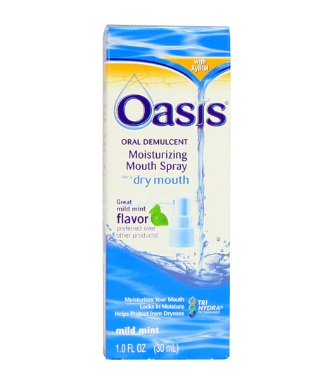Everyone’s had a case of dry mouth, whether it’s due to nervousness, stress or simply not drinking enough water throughout the day. On occasion, dry mouth isn’t harmful (though it can get pretty uncomfortable). If, however, your symptoms last for a couple of days, you might want to consider talking to a medical professional to figure out why it’s happening – and what you can do to solve the problem and get some relief.
What is dry mouth?
Put simply, dry mouth is a condition where not enough saliva is produced to keep the mouth moist.
“Saliva is vital to overall oral health and hygiene, as it plays a pivotal role in breaking down food, keeping your mouth clean, preventing bad breath and neutralizing bacteria-produced acids,” says Dr. Shahrooz Yazdani, board-certified dentist and director and CEO of Costello Family Dentistry.
Unfortunately, if dry mouth persists for too long, your risk increases for developing tooth decay and gum disease. Dry mouth also can lead to dry throat, cracked and chapped lips, burning or tingling sensations in the mouth, bitter aftertaste and excessive thirst. If these symptoms sound familiar, it’s a good idea to check in with your healthcare provider.
Dry mouth causes
When you’re experiencing dry mouth, it’s important to investigate why it’s happening. While some causes are easily identifiable and treatable, others may be more serious and require guidance from a professional. Below are some of the most common dry mouth causes – along with helpful solutions.
Dehydration and thirst
Dehydration is the most common cause of dry mouth. If you’re experiencing dry mouth, you may not be drinking enough water. Try increasing your daily water intake: 3.5 liters for men or 2.5 liters for women, according to Yazdani. Also take a look at your diet. Some diets may make you more susceptible to dehydration. The keto diet, for example, which encourages a state of ketosis, can cause excess thirst.
Remember, too, that water is important for overall saliva production. Adequate salvia helps keep the mouth and tongue moist – preventing and eliminating bad breath as a bonus.
Excess stress and poor adrenal function
While bouts of stress or anxiety can lead to occasional dry mouth, it can become a chronic concern when these states are experienced on a daily basis.
“Dry mouth can certainly be caused by a stress or adrenal response,” says Yazdani. “When a person is under stress, their body’s natural fight or flight response can activate, causing physical symptoms such as increased heart rate, sweating and decreased saliva production.”
This reduction in saliva production can lead to dry mouth. Additionally, some people breathe through their mouths when stressed or fatigued, which can compromise adrenal function and contribute to dry mouth, Yazdani says.
Remember to maintain water intake throughout the day, especially on days where you’re extra stressed and exhausted. Try breathwork or breathing exercises to keep breathing regular, if it’s an issue.
Medication interaction
Hundreds of medications, ranging from ADHD medications to blood pressure or pain medications to anti-depressants, have dry mouth as a known side effect. To avoid long-term discomfort, it’s a good idea to talk to your healthcare provider about dry mouth solutions or potentially taking an alternative medication.
Illness and disease
Diseases such as diabetes, Alzheimer’s and HIV/AIDS can cause dry mouth, as can medical emergencies such as experiencing a stroke. If you’ve been diagnosed with an illness, be sure to talk to your healthcare provider about symptoms you’re experiencing, medication side effects and potential solutions to managing long-term discomforts including dry mouth.
The best dry mouth solutions
Luckily, there are plenty of helpful, easy-to-find dry mouth solutions. Using an oral rinse is incredibly helpful for not only alleviating dry mouth but also for freshening your breath. Biotène is a popular over-the-counter oral rinse that addresses dry mouth symptoms.
“There are a lot of benefits to using mouthwashes like these, such as soothing a dry, uncomfortable mouth and providing relief from general dry mouth symptoms such as thirst, sticky mouth, difficulty speaking and difficulty with tasting food,” Yazdani says. “It can also help with removing food particles and bacteria from the mouth when saliva isn’t doing its role, improving overall oral hygiene and freshening breath,”
Keep in mind that Biotène, as well as other dry mouth mouthwashes, are not a cure for dry mouth. While it does provide relief, you may still need additional health care to pinpoint causes and effectively reduce your symptoms.
Oral sprays and toothpastes specifically formulated to treat dry mouth can help restore moisture in the mouth and reduce dry mouth symptoms. Oral sprays often contain moisturizing agents that soothe and protect the mouth, as well as enzymes, which break down food particles and bacteria. You can also try sucking on dry mouth drops containing xylitol for relief.
Note: When purchasing oral spray or toothpaste for dry mouth, be sure to check labels for ingredients that treat dry mouth, such as enzymes and fluoride.




